This repository contains the code used in Jätteenkuljetusrekisteri for Lahti. The development continues in another fork to be updated to this README later.
This repository contains core parts of Jätteenkuljetusrekisteri including the data model and the importer tool.
This project is intended to be extended by customer specific modifications etc. import format plugins etc.
You probably want install this to a virtual environment so your system python don't get cluttered of dependencies.
$ python -m venv jkr-venv
$ jkr-venv\scripts\activateDownload the whl file etc. jkr-0.1.0-py3-none-any.whl
(jkr-venv) $ pip install jkr-0.1.0-py3-none-any.whlNow import script can be started
(jkr-venv) $ jkr import SIIRTOTIEDOSTO TIEDONTUOTTAJAThe development environment uses Poetry. Install it before anything.
$ git clone https://github.com/GispoCoding/jkr-core.git
$ cd jkr-core
$ poetry installInstall docker and docker-compose (version >= 1.28.0)
Copy .env.template to %APPDATA%/jkr/.env and change parameters
$ cp .env.template .env
# Edit the .env file
$ nano .envdocker-compose --env-file "${env:APPDATA}/jkr/.env" up db -d
docker-compose --env-file "${env:APPDATA}/jkr/.env" up flywayThe diff operation in pgModeler is quite fragile and not recommended used directly.
We use Flyway (for now) to generate database migrations. Flyway is a SQL file based migration system. PgModeler is used to generate diff SQL files and then Flyway is used to apply the migrations.
pgmodeler-cli.exe --export-to-file --input jkr.dbm --output migrations/V1__initial.sql --pgsql-ver 12.0# 1. Verify db is up to date (all current migrations applied) by running
docker-compose --env-file "${env:APPDATA}/jkr/.env" up flyway
# 2. Modify the pgmodeler model
# 3. Create a diff file. Change the conn-alias and output file.
pgmodeler-cli.exe --diff --save --input jkr.dbm --compare-to jkr --conn-alias local-db --output migrations/V2__add_sailio_table.sql --pgsql-ver 12.0
# 4. Validate and modify the migration file
# 5. Migrate by running
docker-compose --env-file "${env:APPDATA}/jkr/.env" up flyway
# 6. Verify all changes in model are apllied to the database by executing step 3 again and checking that no diff is generated.Repairing migrations
docker-compose --env-file "${env:APPDATA}/jkr/.env" run --rm flyway repairdocker-compose run --rm flyway migrate -user=jkr_admin -password=<password> -url=jdbc:postgresql://trepx-paikka1.tre.t.verkko:5432/ymparisto_test_dbThe QGIS project reads data from a PostgreSQL service named jkr with a QGIS authentication which id is jkruser.
- Create a PostgreSQL service file for each environment (Development, Testing, Production) to some folder for example in
<your home folder>/jkrconfig/. Name the files for examplepg_service_jkr_dev.conf,pg_service_jkr_test.conf,pg_service_jkr_prod.conf. Add the following with correct values for each environment:
[jkr]
host=localhost
port=5435
dbname=ymparisto_db- Create a QGIS-profile for each environment (Development, Testing, Production). Name the profiles for example
jkr-dev,jkr-test,jkr-prod. A new QGIS window will open. Use that
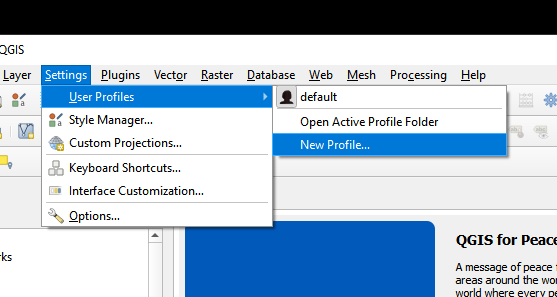
- In QGIS settings add a
PGSERVICEFILEenvironment variable and fill the file path of corresponding service file as a value.
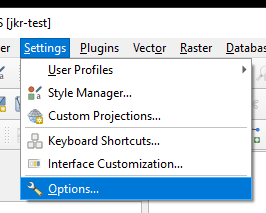
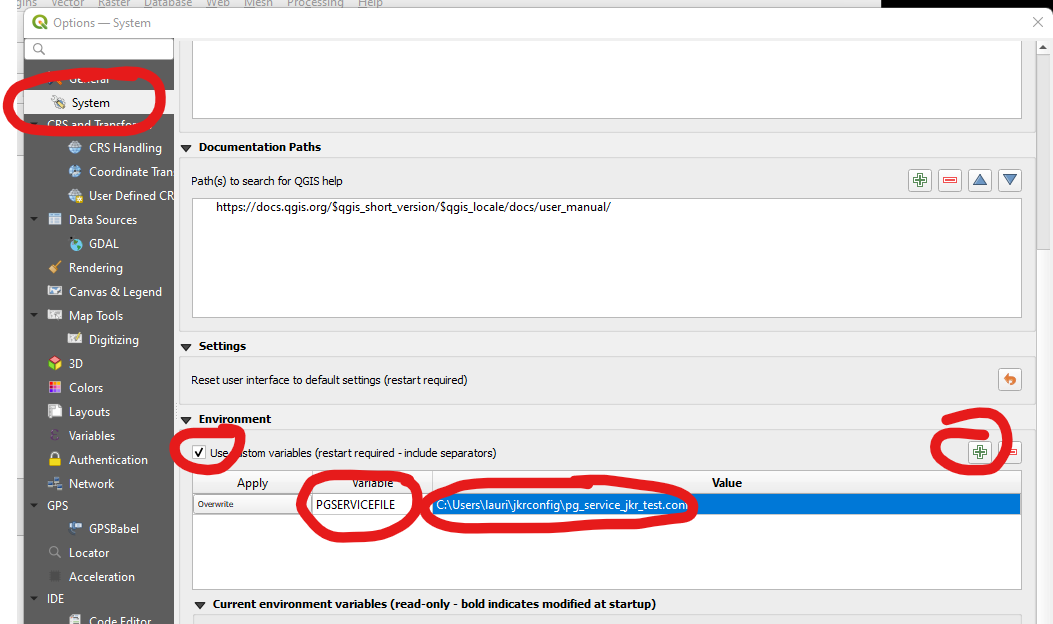
- Restart QGIS to make the environment variable to take effect.
- Create a authentication key to QGIS which ID is
jkruser.
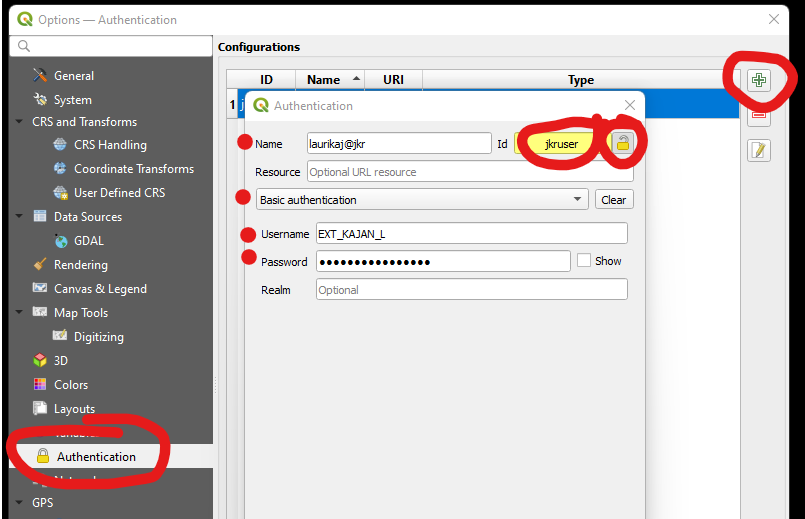
- Create a new PostgreSQL connection
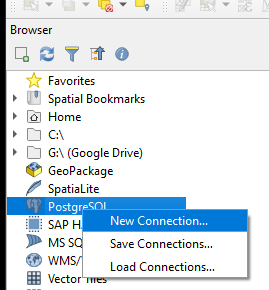
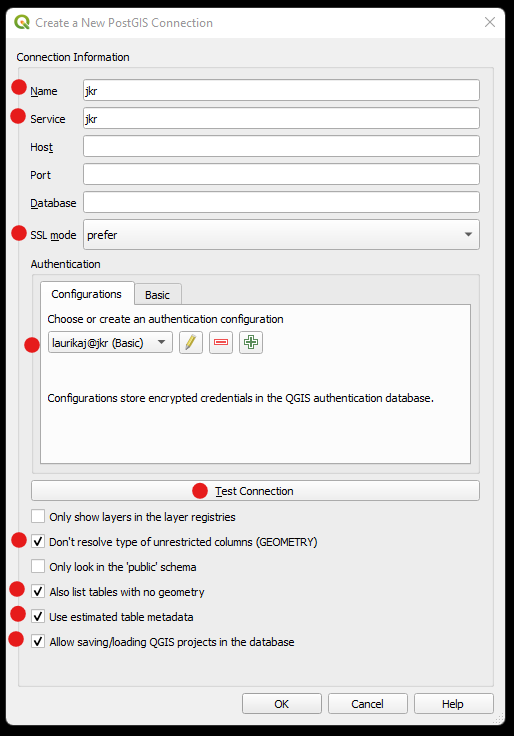
- Open the QGIS project from the jkr-qgis-projektit -schema.
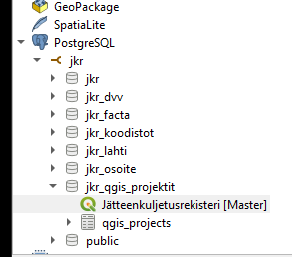
Development
For development use the QGIS-project can be used.
In jkr-core/scripts/jkr_posti.sql, replace <POSTI> with the path to your posti file.
In jkr-core/scripts/import_and_create_kohteet.bat, replace the following lines to match your database connection:
SET HOST=<palvelimen nimi>
SET PORT=<tietokantaportti>
SET DB_NAME=<tietokannan_nimi>
SET USER=<kayttajatunnus>
The single command importer can be called with the following from the root.
jkr import_and_create_kohteet <POIMINTAPVM> <DVV> <PERUSMAKSU> <POSTI>
- Replace with the poimintapäivämäärä of DVV file you're about to import. Required.
- Replace with the filepath of DVV file you're about to import. Required.
- Replace with the filepath of perusmaksurekiseteri file you want to use. If you do not want to use perusmaksurekisteri, leave out of the command.
- Replace with "posti" (without quotation marks) if you want to import posti data. If you do not want to import posti data, leave out of the command.
The testing procedures are under construction. Currently, the tests can be run only in a Windows system. A local test database is created for running the tests. The database is created from scratch each time the tests are run. The docker container for the database isn't stopped after the tests in order to make manual checks available.
-
The settings for the local test database are stored in
%APPDATA%/jkr/.env. Copy the defaults from/tests/.env.template. -
When calling
pytestthe batch file/tests/scripts/init_database.batis run before the tests related to the database.
NOTE:
If your environment contains saved environmental variables, they may cause issues with the tests.
The data used in tests (/tests/data) is mostly dummy data created only for testing fixtures. Currently, there is only one exception.
The postal code data (/tests/data/test_data_import) is real data downloaded from Postal Code Services by Posti. Please see the current service description and terms of use if you share this data further. Service description and terms of use
Because this repository is developed mostly in customer specific projects the label of the project may be good to be included in the branch name. The preferred naming convention is {label-of-project}-{issue-in-that-project}-{description}. For example, "Lahti-99-kuljetustietojen-tallennus". Please avoid umlauts and use hyphens as separators.